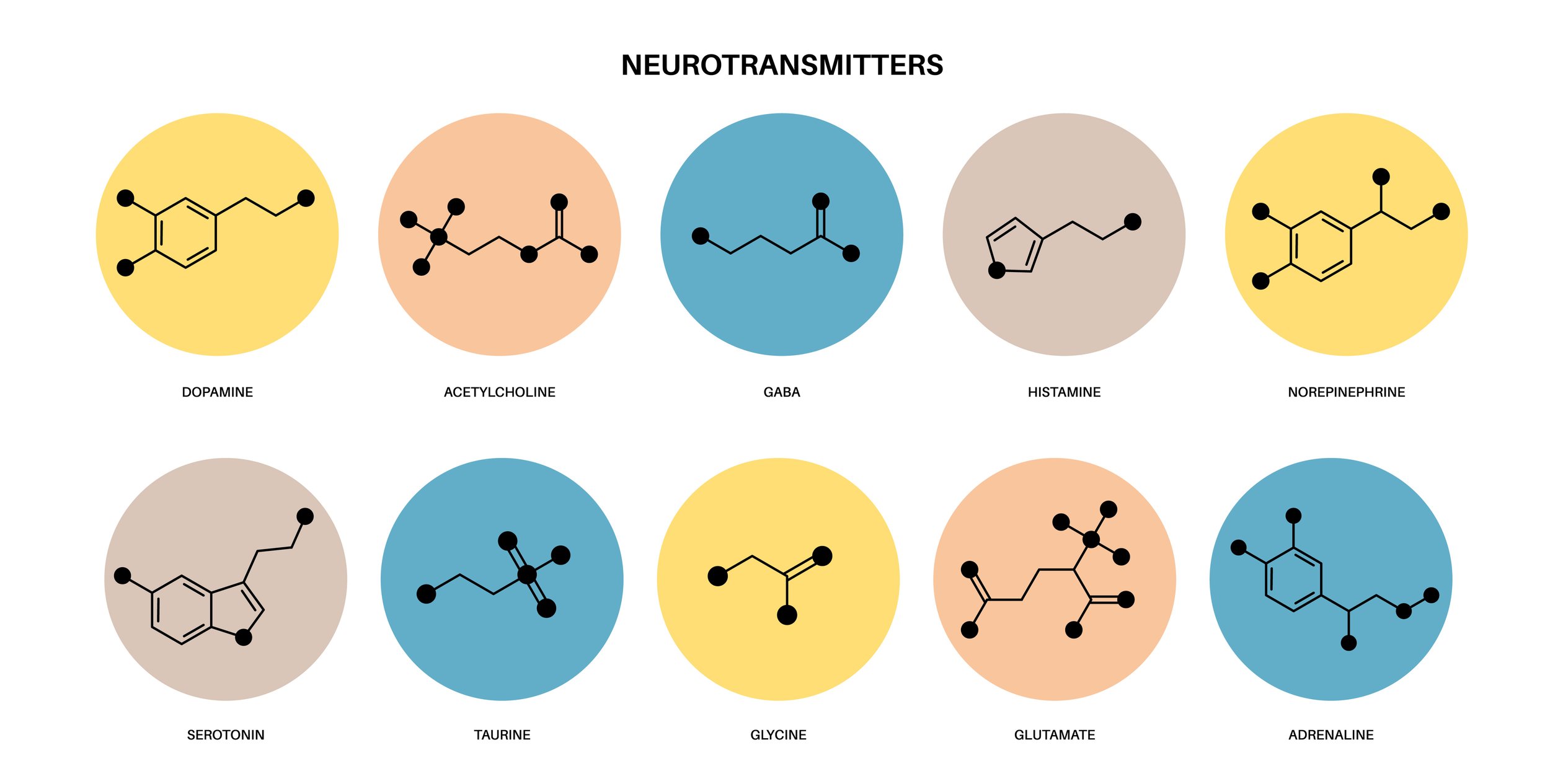
Neurotransmitters
& Your Health
NEUROTRANSMITTERS
Learn if you’re in the 86% of Americans who have suboptimal neurotransmitter levels.
Neurotransmitters are chemical messengers used by the nervous system to relay information from one nerve to another.
Optimal neurotransmitter balance is required to maintain proper health. Imbalances can cause the brain and the body to be over- or under-stimulated, producing neurological or psychological symptoms.
A Dynamic Duo: Testing Hormones with Neurotransmitters
In the neurological system, hormones are synergistic with neurotransmitters – modulating their production, signaling and metabolism. Because of this complex interplay, testing hormones and neurotransmitters together is an ideal way to generate a more precise clinical assessment.
This combined testing gives practitioners a diagnostic edge over the traditional psychological inventory and offers the advantage of zeroing in on which therapies are best suited for individual patients – cutting down on the time-consuming process of trial-and-error for identifying treatment options.
Testing Elements with Neurotransmitters
Heavy metals are damaging to brain health. They disrupt neurotransmitter function and create oxidative stress that is detrimental to nerve cells, contributing to mood disorders, poor memory and dementia. Identifying exposure to heavy metals may be key to assessing and treating mood disorders and preventing neurodegenerative diseases.
In contrast, nutritional elements are generally protective for brain health. Lithium acts directly on the brain by slowing the progression of dementia and stabilizing mood, while elements like iodine and selenium act indirectly by supporting healthy thyroid and brain function.
Neurotransmitters & Their Impact
Neurotransmitters are chemical messengers used by the nervous system to relay information from one nerve to another. The body relays information through the nervous system about anything that it experiences, hears, touches, smells or ingests – continuously communicating back and forth between the brain and the body.
Optimal neurotransmitter balance is required to maintain proper health. Imbalances can cause the brain and the body to be over- or understimulated, producing neurological or psychological symptoms.
Can a Dysregulated Nervous System Impact Health?
Like hormones, neurotransmitters require a delicate balance to keep the body functioning at a peak level.
Genetics, environment, chemicals and nutritional deficiencies are a few factors that can result in over- or under-production of neurotransmitters. Once out of balance, the nervous system begins to compensate – which, in time, can lead to neurological or psychological symptoms.
Some of the more common psychological conditions today are known to be accompanied by neurotransmitter imbalances. However, it’s also possible for individuals to present with similar symptoms yet have unique foundational imbalances. Testing helps clarify these root issues.
How a Dysregulated Nervous System Impacts Health
Common neurotransmitter-related causes of health issues often involve the following scenarios:
Anxiety & Depression
Neurotransmitter imbalances are often associated with anxiety and depression, specifically Glutamate (panic attacks), PEA, Histamine, Serotonin, as well as Epinephrine & Norepinephrine. Learn how Epinephrine & Norepinephrine affect chronic stress.
Chronic Fatigue
An imbalance between excitatory and inhibitory neurotransmitters can lead to persistent fatigue.
Impulsivity
GABA, Dopamine and Serotonin are three chemical messengers commonly linked to disorders like ADD, ADHD & OCD.
Insomnia
Imbalances in Glutamate, Histamine, Dopamine, GABA and Serotonin are often linked to sleep disturbances and insomnia.
PMS or PMDD
Imbalances in Serotonin, Dopamine, Norepinephrine and GABA are often involved in cases of PMDD (pre-menstrual dysphoric disorder) and severe PMS.
Do These Symptoms Sound Familiar?
If you regularly suffer from 3 or more of these symptoms, you might have a neurotransmitter imbalance.
ADD/ADH
Aggression
Anxiety
Depression
Fatigue
Forgetfulness
Hyperactivity
Impulsive behaviors
Insomnia
Mood swings
Obsessive-compulsive disorder (OCD)
Panic attacks
Poor concentration
Pre-menstrual dysphoric disorder (PMDD)
Severe PMS
Sleeping problems
Low libido
Neurotransmitters You Should Know
There are many neurotransmitters in the body.
The primary messengers are divided into two groups:
Excitatory:
Dopamine; generally regarded as the brain’s pleasure and reward center, plays the central role in addiction, improves attention, focus and motivation, and modulates movement control.
Epinephrine and Norepinephrine; regulate the “fight or flight” response, elevated blood pressure and heart rate, stimulate wakefulness and reduce digestive activity.
Glutamate; functions as the “on” switch in the brain. It’s the major excitatory neurotransmitter that decreases sleep, optimizes learning, memory and mood and improves libido.
Histamine; plays a role in the body as a neurotransmitter that increases metabolism, promotes wakefulness and suppresses appetite.
PEA (phenylethylamine); promotes energy, elevates mood, regulates attention, aggression and serves as a biomarker for ADHD.
Inhibitory:
GABA; functions as the “off” switch in the brain. It’s the major inhibitory neurotransmitter that improves mood, relieves anxiety and promotes sleep.
Glycine; plays a dual role as a neurotransmitter and amino acid that serves as a building block to proteins, improves sleep quality, calms aggression and serves as an anti-inflammatory agent.
Serotonin; generally regarded as the “happiness molecule,” contributes to the feeling of calm and well-being that eases depression and anxiety, supports sleep and decreases appetite.


